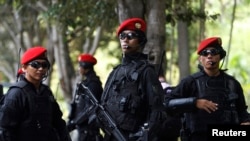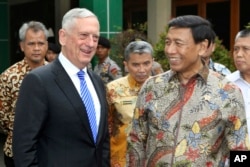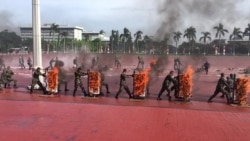Human rights supporters are concerned by the potential relationship between the American military and an Indonesian special forces unit that has been linked to human rights abuses in East Timor, Aceh, and Papua.
Defense Secretary Jim Mattis stated that he will explore reopening ties with the unit, called Kopassus, even though it is currently precluded under the so-called Leahy Laws, sponsored by Vermont Senator Patrick Leahy (D), which state that the State Department and military are barred from assisting any foreign security forces that have violated human rights “with impunity.”
“United States aid conveys legitimacy, and it assumes a common respect for justice and human rights,” said Sen. Leahy last week. “The question Secretary Mattis needs to answer is whether the Indonesian government has punished the Kopassus officers who ordered and covered up those horrific crimes, and whether members of Kopassus today are accountable to the rule of law.”
"All superpowers including the U.S. have a moral obligation to make our world better," said Andreas Harsono, a senior researcher with Human Rights Watch Indonesia. He criticized the potential partnership by writing that “to restore assistance to Kopassus is to reward Indonesia for doing nothing.”
Secretary Mattis visited Indonesia last week and was met with a spectacular display from the country’s troops, who drank snake blood, walked on fire, rolled in glass, and performed a hostage rescue demonstration to the tune of “Mission Impossible.”
History of Kopassus
Kopassus, which is short for "Special Forces Command” in Indonesian, was founded in 1952 and its activities include unconventional warfare, sabotage, counter-insurgency, counter-terrorism, and intelligence. It gained notoriety for its abuses in East Timor during the Indonesian occupation there (which ended in 1999) and in the 1998 Jakarta race riots, when Kopassus was involved in the murders of and violence against Chinese Indonesians. The unit was strongest during the Suharto dictatorship, which fell in 1998, and has had a somewhat diminished stature in the democratic era.
“It is still in a prestigious position for sure, but it’s a far cry from its position during Suharto’s New Order,” said Yohanes Sulaiman, a defense studies professor at General Achmad Yani University. “If there’s normalization [of relations with the U.S.], the head of Kopassus could be very important again.”
“The big question is whether the United States Senate will allow it, since there’s no way Kopassus will apologize or be held responsible for what happened in East Timor,” said Sulaiman. “It’s hard to say what the outcome will be because the ball is in the United States’ court, not Indonesia’s.”
WATCH: Indonesian Special Forces demonstration
Mattis’s Indonesia counterpart, Ryamizard Ryacudu, expressed hope that the U.S. would reverse its sanctions on the unit, which were made in light of rights abuses in East Timor during that nation’s independence struggle in the late 1990’s.
“For a while there have been sanctions against Kopassus ... [Mattis] will try to remove this,” said Ryacudu last week. “One of the sanctions is clearly that they are not allowed to go to America. They can’t do training together, and he will reopen this.”
Mattis told reporters in Jakarta that the military would go through “established procedures” to consider reopening ties with Kopassus.
US / Indonesia ties
Mattis’s Indonesia trip came at the heels of his strategy to strengthen foreign military alliances as a bulwark against Russian and Chinese power. But it’s unlikely that Indonesia will go out of its way to take sides, so to speak, between the U.S. and China.
Although Indonesia has been lately vocal on issues in the South China Sea, that has more to do with its own sovereign interests than great power geopolitics. In fact, ever since founding the Non-Aligned Movement in the Cold War, Indonesia has taken pains to not to form explicit alliances with world powers like the U.S.
“Why is Indonesia careful about relations with China? Economics, of course,” said Arbi Sanit, a political scientist at the University of Indonesia. “Chinese investments in Indonesia have been rising steadily, so that is always a concern."
Indonesia exports roughly the same amount to China and the U.S. ($16 billion) but imports much more from China: $30.1 billion vs $7.3 billion. China is its number one trade partner for both imports and exports by volume. "At the same time," said Sanit, "America’s power has decreased in the region and they want to change that… But I think what Indonesia will continue to prioritize in foreign policy is independence — against ASEAN, against China, and also against the United States.”







